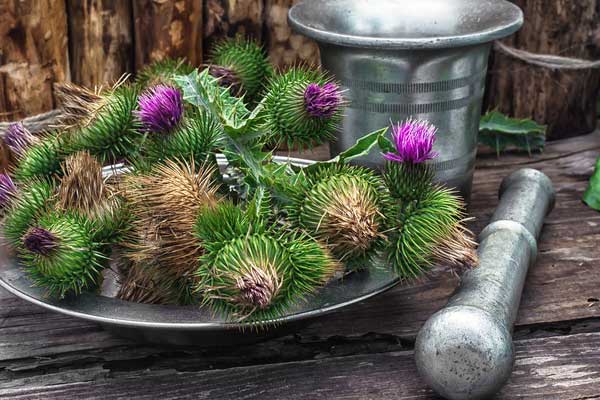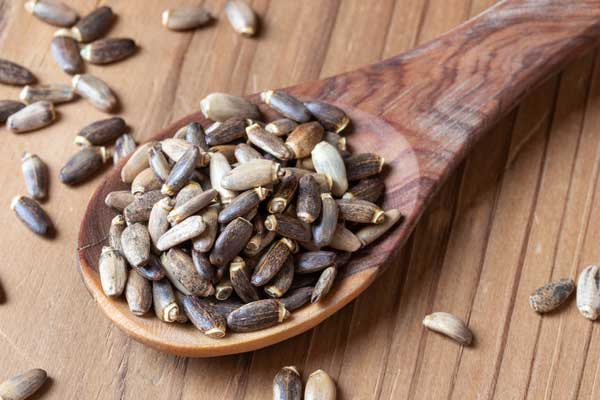The liver is a vital organ that performs over 500 essential functions in the body. Unfortunately, liver disease is becoming increasingly common, affecting both adults and children. One of the most beneficial herbs for supporting liver health is milk thistle. In this in-depth article, learn how milk thistle protects the liver, reverses damage, and promotes regeneration.
There are three main types of liver disease – fatty liver, cirrhosis, and hepatitis. Fatty liver comes in two forms, alcoholic fatty liver disease (AFLD) from excessive alcohol intake, and non-alcoholic fatty liver disease (NAFLD) which is linked to insulin resistance. Cirrhosis involves the formation of scar tissue, while hepatitis refers to liver inflammation. Milk thistle contains active compounds called silymarin that benefit all three liver conditions in multiple ways.

Key Benefits of Milk Thistle for the Liver
Protects Against Toxins and Medications
The main benefit of milk thistle is protecting liver cells from harmful substances like medications, alcohol, pollutants, poisonous mushrooms, and even snake venom. The antioxidants in milk thistle fortify liver cell membranes, preventing toxins from entering and causing damage. This makes it an essential supplement for anyone on medications like painkillers, antidepressants, or chemotherapy which strain liver function.
Reverses Fatty Liver Disease
The insulin resistance underlying NAFLD causes fat to accumulate in and around liver cells, resulting in inflammation and impaired function. Milk thistle aids in fat breakdown, decreases fat deposits in the liver, and improves insulin sensitivity – effectively combatting fatty liver disease. The herb also reduces visceral fat around organs.
Promotes Liver Cell Regeneration
Milk thistle stimulates protein synthesis to enhance the regeneration of liver cells. This allows the liver to repair damage and restore its critical functions. Milk thistle has been shown to significantly improve liver enzyme levels, indicating a reduction in inflammation and improvement in liver health.
Fights Hepatitis and Cirrhosis
Thanks to its anti-inflammatory and antioxidant properties, milk thistle reduces inflammation in hepatitis. It also protects against the progression of liver disease to advanced cirrhosis. Milk thistle strengthens cell membranes in the liver, preventing toxins from flooding out into the bloodstream during cirrhosis.
Supports Blood Sugar and Mental Health
Interestingly, beyond the liver, milk thistle has also been found beneficial for blood sugar regulation, lowering insulin and glucose levels. It may also alleviate symptoms of depression.
The Active Ingredients – Silymarin
The key active ingredient in milk thistle is the antioxidant compound silymarin. This is found primarily in the seeds, which can be ground into powder and consumed. Let’s explore how to identify and harvest milk thistle for its medicinal properties.

Identifying and Harvesting Milk Thistle
Milk thistle is a prickly flowering herb that grows widely across North America. It flourishes in sunny areas and is often considered an invasive weed. You can identify milk thistle by its purple thistle flowers which turn white and fluffy as they mature.
To harvest, wait for the two-week window when the flowers are white. Then wearing gloves, cut off the upper flowering tops. Hang them upside down and shake out the seeds into a bag or bowl. You’ll need to separate the white parachute-like fibers. Grind the seeds in a coffee grinder and add to foods like smoothies, salads, and shakes.
Consuming Milk Thistle for Liver Health
Milk thistle seeds have a mild, nutty taste and can be easily incorporated into foods or brewed as tea. Typical dosage is 120-140mg of silymarin one to three times daily. Consider combining with other liver-supporting foods like turmeric, garlic, grapefruit, avocado, olive oil, and leafy greens. For advanced liver disease, milk thistle extracts may provide stronger therapeutic effects.
Conclusion
With rising rates of liver disease, milk thistle is one of the best protective and restorative herbs to support liver function. Its active compound silymarin demonstrates extensive benefits – protecting the liver from harm, reversing fatty liver deposits, stimulating liver cell regeneration, fighting hepatitis and cirrhosis, regulating blood sugar, and improving mental health. Milk thistle is extremely accessible as the seeds can be harvested from the common weed and easily added to foods and drinks. Consider incorporating this potent medicinal herb into your regimen for optimal liver health.
